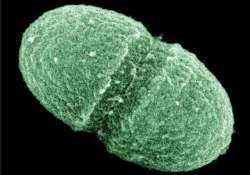Researchers use smartphone app to study factors affecting gut bacteria
New Delhi: A smartphone app used by two volunteers for one year to track their daily life has thrown interesting results about the composition of gut bacteria and its close relationship with health. These participants used

New Delhi: A smartphone app used by two volunteers for one year to track their daily life has thrown interesting results about the composition of gut bacteria and its close relationship with health.
These participants used smartphone apps to collect information every day for a year in the study by scientists from Massachusetts Institute of Technology (MIT) and Harvard University.
They logged their daily activity, including diet, exercise, bowel movements and mood and submit regular stool and saliva samples.
The samples were analysed in detail to see what had the greatest effect on the composition of the microbiota.
The results showed that the participants had a “default” microbiota which were unaffected by sleep levels, exercise and mood.
What did have a significant effect on the microbiota were two life events - one subject moved abroad while the other had a significant bout of food poisoning which caused most pre-existing gut bacterial species to decline.
“Life events such as visiting another country or contracting a disease cause a significant shift in the make-up of the gut microbiota - the community of bacteria living in the digestive system,” researchers explained.
The authors think the method could be rolled out to studies of human-bacteria relationships with many more participants.
This has given us a lot of new ideas for follow up studies and analyses of gut microbial ecology as well as infectious diseases in humans,” professor Lawrence David from Duke University said.
The study published in the open access journal Genome Biology.
These participants used smartphone apps to collect information every day for a year in the study by scientists from Massachusetts Institute of Technology (MIT) and Harvard University.
They logged their daily activity, including diet, exercise, bowel movements and mood and submit regular stool and saliva samples.
The samples were analysed in detail to see what had the greatest effect on the composition of the microbiota.
The results showed that the participants had a “default” microbiota which were unaffected by sleep levels, exercise and mood.
What did have a significant effect on the microbiota were two life events - one subject moved abroad while the other had a significant bout of food poisoning which caused most pre-existing gut bacterial species to decline.
“Life events such as visiting another country or contracting a disease cause a significant shift in the make-up of the gut microbiota - the community of bacteria living in the digestive system,” researchers explained.
The authors think the method could be rolled out to studies of human-bacteria relationships with many more participants.
This has given us a lot of new ideas for follow up studies and analyses of gut microbial ecology as well as infectious diseases in humans,” professor Lawrence David from Duke University said.
The study published in the open access journal Genome Biology.